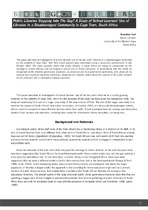Public Libraries Stepping into the Gap?: A Study of School Learners' Use of Libraries in a Disadvantaged Community in Cape Town
Abstract
According to public library staff none of the Vista schools has a functioning library or a librarian on its staff. In itslack of school libraries Vista is no different from other parts of South Africa. Less than a third of South African schoolshave any sort of library (Department of Education, 1999). Yet South Africa's new curriculum's shift from rote-learningand examinations towards constructivist resource-based approaches expects schools to engage in independent projectand portfolio work.Given the demands of the new curriculum and given the shortage of school libraries, in the past few years therehave been suggestions that South Africa's fairly well-developed public library system might step into the gap and play amore explicitly educational role. At the same time, in public library circles throughout Africa, there have beensuggestions that we need a different model of public librarianship from that in the developed world (Sturges & Neill,1998; Issak, 2000). In the developing world, where school library services are inadequate and where the targetpopulation of libraries is largely youth, the argument is that providing for formal education might well be a primaryfunction of public library services. And indeed there is evidence that South African libraries are moving in thiseducational direction. The annual reports of the large provincial public library governance structures show that they arespending a bigger slice of their budget on educational materials. And at most gatherings of public librarians in SouthAfrica there are calls for increased funds to cope with the pressures of increased school use (Hendrikz, 1998; Leach,1998).

